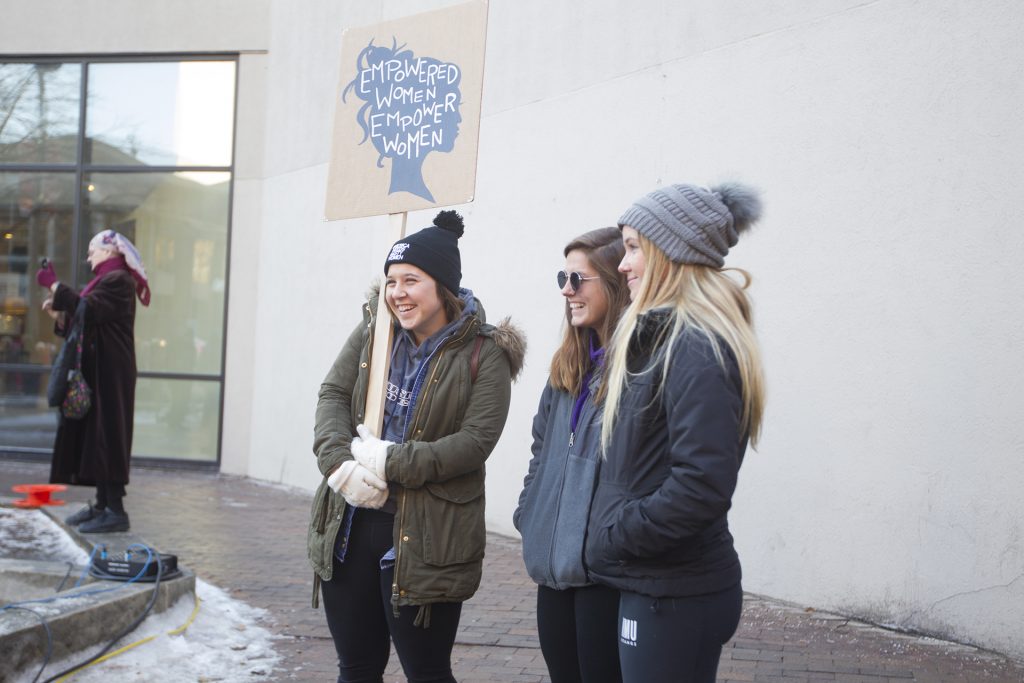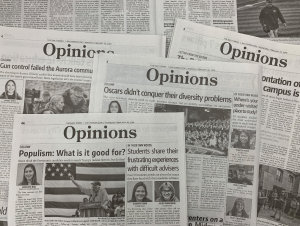Neal: Women’s History Month: reflecting on a racial truth
As Women’s History Month marches on (pun-intended), we must reflect on who paved the way for women today to grow in success. But more importantly, we must acknowledge that for white women, the road was much different.
The Daily Iowan; Photos by Katie
Students smile during the Women’s March on January 20, 2018. Hundreds gathered on the Ped Mall to listen to speakers and march for women’s rights. (Katie Goodale/The Daily Iowan)
March 4, 2019
We’re almost a week into Women’s History Month — and for me, this means one thing: reflection.
As a college-age woman studying political science, I’ve always been fascinated by the democratic process, and more importantly, the steps taken by the women before me to allow me the privilege to act on this civic-driven fascination.
As an Iowa-registered voter, some of the state’s well-known female leaders come to mind — Gov. Kim Reynolds, the state’s first female governor.
Sen. Joni Ernst, both a veteran of the U.S. military and the U.S. Senate.
Rep. Abby Finkenauer, who beat incumbent Rod Blum in 2018’s midterm election.
These women, political affiliations aside, are trailblazers in their own right — but there is something to be acknowledged: They’re white.
All right, before I get pinned as just another “brainwashed liberal” attending a “far-left” university (which by the way, are some of my favorite labels) hear me out.
RELATED: Fourth Wave Feminism and its political implications
I’m not saying their accomplishments are moot because of their skin color. What I am saying is, and I say this as a 21-year-old white woman, the roads paved for white women were far less treacherous than those paved for women of color.
I often hear that oppression is a choice. That if you, even for a minute, suggest that your life holds inherent obstacles independent from what you can control, you are a “liberal snowflake.”
But let me explain one of the many reasons this isn’t true.
From my middle-school days studying the U.S. Constitution, I learned that the women’s suffrage movement was an all-encompassing female movement drastically unifying women from across the nation.
The women’s suffrage movement was a WHITE women’s movement. Susan B. Anthony, who is presumably one of the movement’s most recognizable leaders, famously said, “I will cut off this right arm of mine before I will ever work or demand the ballot for the Negro and not the woman.”
Um … what?
We didn’t learn about that in eighth grade U.S. history. And what’s worse? The young women of color, sitting right beside me in that middle-school classroom, had to listen blindly as a woman nearly advocating for white supremacy was basically idolized.
RELATED: Neal: Women in Washington: Could empowerment lead to bipartisanship?
I’m not blaming today’s white female leaders for the actions of the white female suffrage movement, nor am I specifically targeting curriculum taught in American classrooms.
What I’m saying is we have to acknowledge that “white feminism” isn’t the feminism we need.
In other words, we don’t just want the further advancement of white women. We want the advancement of black women, Hispanic women, Asian women, Middle Eastern women — ALL women — and to do this, we have to acknowledge that as white women, our pathway to unequivocal equality has way fewer roadblocks.
It just does.
Remember at the beginning, before I got on my soapbox, and mentioned the importance of reflection? The importance of really, truly understanding how, as women, we got to where we are today?
Not to sound too much like a Hallmark card, but that’s what Women’s History Month should be about. And in that, we must make the conscious effort to be unapologetically inclusive and empowering for all women — everywhere, every day.







